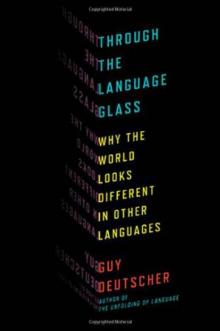Through the Language Glass: Why the World Looks Different in Other Languages


Author: Guy Deutscher
Category: Other3
Published: 2010
Series:
View: 293
Read Online### Review
• _The New York Times_ “Editor’s Choice”
• _The Economist_ “Best Books of 2010”
• _Financial Times_ “Best Books of 2010” • _Library Journal_ “Best Books of 2010”
“Fascinating reading.… Deutscher does not merely weave little-known facts into an absorbing story. He also takes account of the vast changes in our perceptions of other races and cultures over the past two centuries.”
— Derek Bickerton, _The New York Times Book Review_
“An informative, pleasurable read… A gifted writer, Deutscher picks his way nimbly past overblown arguments to a sensible compromise.”
—Amanda Katz, _The Boston Globe_
“A thrilling and challenging ride.”
— Christopher Schoppa, _The Washington Post_
“Brilliantly surveys the differences words and grammar make between cultures.”
—Carlin Romano, _The Chronicle of Higher Education_
“A most entertaining book, easy to read but packed with fascinating detail.”
—Michael Quinion, _World Wide Words_
“_Through The Language Glass_ is so robustly researched and wonderfully told that it is hard to put down… Deutscher brings together more than a century’s worth of captivating characters, incidents, and experiments that illuminate the relationship between words and mind… He makes a convincing case for the influence of language on thought, and in doing so he reveals as much about the way color words shape our perception as about the way that scientific dogma and fashion can blind us.”
— Christine Kenneally, _New Scientist _
“This fabulously interesting book describes an area of intellectual history replete with brilliant leaps of intuition and crazy dead-ends. Guy Deutscher, who combines enthusiasm with scholarly pugnacity, is a vigorous and engaging guide to it… A remarkably rich, provocative, and intelligent work.”
— Sam Leith, _The Sunday Times_ (UK)
“A brilliant account of linguistic research over two centuries… As befits a book about language, this inspiring amalgam of cultural history and science is beautifully written.”
— Clive Cookson, _Financial Times_ (UK)
“A delight to read.”
—Christopher Howse, _The Spectator_ (UK)
“Fascinating and well written… Deutscher’s scholarly and eloquent prose made the book an enjoyable read and I learnt lots of great anecdotes along the way.”
—Alex Bellos, _The Guardian_ (UK)
“Deutscher writes as clearly and engagingly as can be… Will this study of language make you giddy? Oh, absolutely.”
—Craig Brown, _The Mail on Sunday_ (UK)
“Jaw-droppingly wonderful… A marvelous and surprising book. The ironic, playful tone at the beginning gradates into something serious that is never pompous, something intellectually and historically complex and yet always pellucidly laid out. It left me breathless and dizzy with delight.”
—Stephen Fry, presenter of _Stephen Fry in America_, host of _QI_, and author of _Moab Is My Washpot_
“At once highly readable and thoroughly learned... Here is an important and original new history of the struggle to understand how language, culture, and thought are connected.”
—Joan Bybee, Distinguished Professor of Linguistics, University of New Mexico
### Product Description
**A masterpiece of linguistics scholarship, at once erudite and entertaining, confronts the thorny question of how—and whether—culture shapes language and language, culture**
Linguistics has long shied away from claiming any link between a language and the culture of its speakers: too much simplistic (even bigoted) chatter about the romance of Italian and the goose-stepping orderliness of German has made serious thinkers wary of the entire subject. But now, acclaimed linguist Guy Deutscher has dared to reopen the issue. Can culture influence language—and vice versa? Can different languages lead their speakers to different thoughts? Could our experience of the world depend on whether our language has a word for "blue"?
Challenging the consensus that the fundaments of language are hard-wired in our genes and thus universal, Deutscher argues that the answer to all these questions is—yes. In thrilling fashion, he takes us from Homer to Darwin, from Yale to the Amazon, from how to name the rainbow to why Russian water—a "she"—becomes a "he" once you dip a tea bag into her, demonstrating that language does in fact reflect culture in ways that are anything but trivial. Audacious, delightful, and field-changing, _Through the Language Glass_ is a classic of intellectual discovery.
• _The New York Times_ “Editor’s Choice”
• _The Economist_ “Best Books of 2010”
• _Financial Times_ “Best Books of 2010” • _Library Journal_ “Best Books of 2010”
“Fascinating reading.… Deutscher does not merely weave little-known facts into an absorbing story. He also takes account of the vast changes in our perceptions of other races and cultures over the past two centuries.”
— Derek Bickerton, _The New York Times Book Review_
“An informative, pleasurable read… A gifted writer, Deutscher picks his way nimbly past overblown arguments to a sensible compromise.”
—Amanda Katz, _The Boston Globe_
“A thrilling and challenging ride.”
— Christopher Schoppa, _The Washington Post_
“Brilliantly surveys the differences words and grammar make between cultures.”
—Carlin Romano, _The Chronicle of Higher Education_
“A most entertaining book, easy to read but packed with fascinating detail.”
—Michael Quinion, _World Wide Words_
“_Through The Language Glass_ is so robustly researched and wonderfully told that it is hard to put down… Deutscher brings together more than a century’s worth of captivating characters, incidents, and experiments that illuminate the relationship between words and mind… He makes a convincing case for the influence of language on thought, and in doing so he reveals as much about the way color words shape our perception as about the way that scientific dogma and fashion can blind us.”
— Christine Kenneally, _New Scientist _
“This fabulously interesting book describes an area of intellectual history replete with brilliant leaps of intuition and crazy dead-ends. Guy Deutscher, who combines enthusiasm with scholarly pugnacity, is a vigorous and engaging guide to it… A remarkably rich, provocative, and intelligent work.”
— Sam Leith, _The Sunday Times_ (UK)
“A brilliant account of linguistic research over two centuries… As befits a book about language, this inspiring amalgam of cultural history and science is beautifully written.”
— Clive Cookson, _Financial Times_ (UK)
“A delight to read.”
—Christopher Howse, _The Spectator_ (UK)
“Fascinating and well written… Deutscher’s scholarly and eloquent prose made the book an enjoyable read and I learnt lots of great anecdotes along the way.”
—Alex Bellos, _The Guardian_ (UK)
“Deutscher writes as clearly and engagingly as can be… Will this study of language make you giddy? Oh, absolutely.”
—Craig Brown, _The Mail on Sunday_ (UK)
“Jaw-droppingly wonderful… A marvelous and surprising book. The ironic, playful tone at the beginning gradates into something serious that is never pompous, something intellectually and historically complex and yet always pellucidly laid out. It left me breathless and dizzy with delight.”
—Stephen Fry, presenter of _Stephen Fry in America_, host of _QI_, and author of _Moab Is My Washpot_
“At once highly readable and thoroughly learned... Here is an important and original new history of the struggle to understand how language, culture, and thought are connected.”
—Joan Bybee, Distinguished Professor of Linguistics, University of New Mexico
### Product Description
**A masterpiece of linguistics scholarship, at once erudite and entertaining, confronts the thorny question of how—and whether—culture shapes language and language, culture**
Linguistics has long shied away from claiming any link between a language and the culture of its speakers: too much simplistic (even bigoted) chatter about the romance of Italian and the goose-stepping orderliness of German has made serious thinkers wary of the entire subject. But now, acclaimed linguist Guy Deutscher has dared to reopen the issue. Can culture influence language—and vice versa? Can different languages lead their speakers to different thoughts? Could our experience of the world depend on whether our language has a word for "blue"?
Challenging the consensus that the fundaments of language are hard-wired in our genes and thus universal, Deutscher argues that the answer to all these questions is—yes. In thrilling fashion, he takes us from Homer to Darwin, from Yale to the Amazon, from how to name the rainbow to why Russian water—a "she"—becomes a "he" once you dip a tea bag into her, demonstrating that language does in fact reflect culture in ways that are anything but trivial. Audacious, delightful, and field-changing, _Through the Language Glass_ is a classic of intellectual discovery.
 Trash Talk
Trash Talk The Windmill of Kalakos
The Windmill of Kalakos Nefarious Doings
Nefarious Doings Shattered (A Bad Boy Romance Novel)
Shattered (A Bad Boy Romance Novel) Bleeding Heart
Bleeding Heart Voices of the Future
Voices of the Future Drawn to the Alpha: Alphas in Heat Book Two
Drawn to the Alpha: Alphas in Heat Book Two Take Me in Your Arms
Take Me in Your Arms